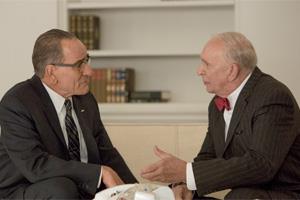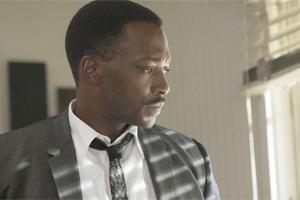JFK has been center stage far more than LBJ on screens small and large.
But in terms of a chops-licking acting challenge, the strong-arming, deep-drawling, oft-uncouth son of Stonewall, Texas is the role to beat.
Bryan Cranston, who won a Tony Award for his portrayal of LBJ on Broadway, returns to conquer him again in HBO’s film adaptation of All the Way. Premiering Saturday, May 21 at 8 p.m. ET, it’s another five-star triumph for the former Breaking Bad star. So much so that they might as well engrave his name on another Emmy Award after he won four of them as chemistry teacher turned drug lord Walter White.
Cranston, without benefit of any heavy prosthetic encasement, bears a striking resemblance to the wheeler-dealer who became President after the Nov. 22, 1963 assassination of John F. Kennedy. It’s a remarkable transformation, with Cranston commanding every scene he’s in with the able assistance of a solid supporting cast. But this is Cranston’s baby through and through. Whether breathing fire, belittling or sweet-talking, his Lyndon Baines Johnson surely is the definitive one.
The film (and it’s very much a film, not a static taping of the play) begins with three shots ringing out on that awful day in Dallas. LBJ is soon in the saddle, staring at his inherited vacant desk in the Oval Office.
“Accidental president. That’s what they’ll say,” he tells his loyal and resilient wife, Lady Bird (sturdy work by Melissa Leo).
“Well, we’ll have to change that next November,” she tells him.
Directed by Jay Roach and with an executive producer team that includes Steven Spielberg, All the Way is reminiscent of the latter’s Lincoln in its depiction of horse-trading and infighting in pursuit of passing the first portion of what would be the Johnson administration’s landmark Civil Rights Act. But where Lincoln was quietly determined to get his way, LBJ is loudly intent on getting the votes needed to bust up a Senate filibuster.

“I’m comin’ for ya, Dick,” he informs longtime friend Richard Russell (Frank Langella, left), the segregationist senator from Georgia. “Now I love ya more than my own daddy. But if you get in my way, I’ll crush ya.”
Although prone to insecurities (“I could drop dead tomorrow, and there wouldn’t be 10 people who’d shed a tear”) and misgivings about going too fast, this is not the historically inaccurate, villainous LBJ of the feature film Selma. The President and Martin Luther King, Jr. (Anthony Mackie, below, left) have their differences, as does King with the increasingly impatient Stokely Carmichael (Mo McRae). Still, they’re basically on the same page and in pursuit of the same goal -- a sweeping voting rights act to follow legislation that officially outlaws discrimination based on race, color or national origin. J. Edgar Hoover, played by Stephen Root in All the Way, is the devil incarnate in both films.
LBJ’s principal White House ally is his guff-taking vice president, Hubert Humphrey. Bradley Whitford, who first came to national prominence as White House Chief of Staff Josh Lyman in The West Wing, outwardly seems like an odd choice to play the portly, balding Humphrey. But he’s surprisingly effective and affecting in the role. At one point, he tells the self-pitying boss man, “I stood up for you, Mr. President.”
“Somebody who matters,” LBJ retorts. That’s gotta hurt. The President then chides Humphrey for being “so thin-skinned.”
LBJ also can be more fun than the law should allow, instructing his White House tailor in the early going, ”Not too tight in the bung hole. And leave some room for my nut sack.” And if that’s not coarse enough, he describes Humphrey as nice before adding, “Nice is what you call a gal with no tits, no ass and no personality.” Donald Trump . . . oh, never mind.
All the Way is instructive as well. In the early 1960s, the Deep South remained solidly Democratic. But LBJ’s championing of the Civil Rights Act changed all of that. Although he won the 1964 election in a landslide over Barry Goldwater, the Republican carried Russell’s Georgia as well as Mississippi, Alabama, South Carolina and Louisiana. It was the first time that Georgia had ever voted Republican in a presidential election. In 1960, JFK had beaten Republican Richard Nixon in all five of these Deep South states.

Sensing the outcome in the 1964 election after he signs the Civil Rights Act in July of that year, LBJ tells Humphrey, “The Democratic Party just lost the South for the rest of my lifetime. And maybe yours. What the (bleep) are you so happy about?”
All the Way, which cries out for a sequel, ends with a victory party for LBJ, who first narrates morosely, “The sun will come up and the knives will come out... They will gut me like a deer.”
Vietnam was on his horizon at that point. And the war ended up both draining his spirit and overshadowing the legacy of a man who got things done domestically and eventually also pounded home the Voting Rights Act of 1965.
This is a riveting film with a bravura performance by Cranston, who’s been the signature television actor of the past decade. All the Way again shows there’s nothing he can’t do -- with the exception of giving a bad performance.
GRADE: A
Email comments or questions to: unclebarky@verizon.net